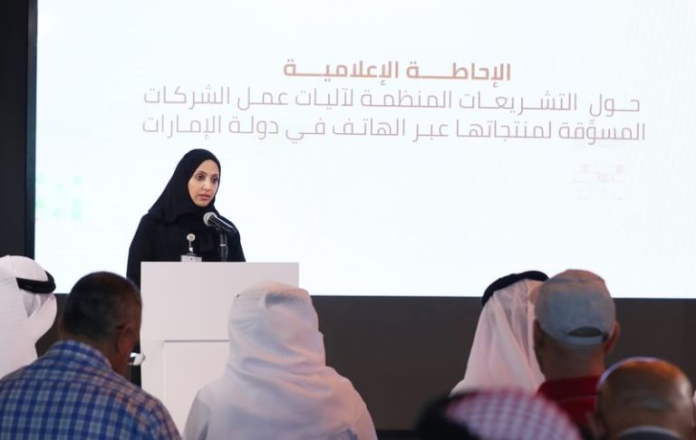The UAE Ministry of Economy clarifies the “controls of companies marketing their products over the phone and the fines for violators”
The Ministry of Economy highlighted the administrative penalties and financial fines imposed on companies and individuals in online marketing operations.PhoneThe decision specified 18 types of violations and administrative penalties for companies, ranging in value from AED 10,000 to AED 150,000, depending on the type, nature and repetition of the violation.
Fines for individuals range from AED 5,000 to AED 50,000. This came yesterday during a media briefing held by the ministry at its headquarters in Dubai, in which it reviewed the country’s efforts in regulating the marketing of products or services via phone calls and the details of Cabinet Resolutions No. 56 of 2024 regarding regulating marketing via phone calls, and No. 57 of 2024 regarding violations and administrative penalties for actions that violate the provisions of Cabinet Resolution No. 56 of 2024, according to what was stated byEmirates News Agency.
Marketing Terms”
The Ministry addressed the obligations of licensed companies in the country when making marketing phone calls, including obtaining prior approval to practice marketing activity from the competent authority, providing comprehensive training for the company’s marketers on the ethics of professional conduct when making marketing calls to consumers, using local phone numbers issued by licensed telecommunications companies in the country, and not calling for the purpose of marketing products or services to consumers whose numbers are listed in the “Do Not Call Register” (DNCR).
Call log and times
The obligations specified by Resolution No. 56 of 2024 also included keeping a record of all marketing phone calls made, according to the form prepared by the competent authority, to ensure the provision of the minimum data and information on marketing activities carried out through marketing phone calls, and not destroying them until after the expiry of the period specified by the competent authority, and recording marketing phone calls, with the necessity of notifying the consumer of this recording when the call begins,
and companies’ commitment to the Code of Professional Conduct, in addition to adhering to the specified times for making phone calls at the beginning of the marketing phone call, during the period from 9 am to 6 pm, with the company’s commitment to identifying its identity and the purpose of the call at the beginning of the marketing phone call, and disclosing the source of obtaining the consumer’s phone numbers and data if requested by the competent authorities, and not using phone numbers that are not registered or owned by the company licensed in the country when making marketing phone calls.
Telemarketing Mechanisms
The decisions organized the work mechanisms of companies marketing their products and services via telephone by setting several controls that marketing companies must follow, including not using any marketing methods that put unjustified pressure on the consumer in order to convince him of the product or service provided, avoiding deception and misleading calls when marketing the product or service,
not calling the consumer back if he rejects the product or service in the first call, or if he does not answer the call or ends the call more than once a day, and a maximum of twice a week, and asking the consumer a question that includes the extent of his desire to complete the phone call or not before starting marketing, advertising and promoting the product or service provided.
Cabinet Resolution No. 56 of 2024 regarding the regulation of marketing via telephone calls defined the competencies of the competent authorities, as the Ministry of Economy is responsible for following up and supervising the implementation of this resolution and related resolutions, and submitting periodic reports to the Cabinet regarding them. The Telecommunications Regulatory Authority and the Digital Government supervise the “Do Not Call Register” (DNCR), and coordinate and follow up with the relevant authorities in setting controls and mechanisms, exchanging data and raising awareness, as well as supervising and monitoring natural persons.
Central Bank jurisdiction
The Central Bank of the United Arab Emirates is responsible for everything related to telephone calls for marketing the services of banks, other financial institutions and establishments, insurance companies and related professions in the country, while the Securities and Commodities Authority is responsible for everything related to telephone calls for marketing securities and commodities trading services in the country, while the licensing authorities in the mainland and free zones at the level of each emirate are responsible for everything related to telephone calls for marketing products or services in the country, except for what falls under the jurisdiction of the Central Bank and the Securities and Commodities Authority.
Free zones inclusion
Her Excellency Safia Hashim Al Safi, Acting Assistant Undersecretary for Commercial Control and Governance Sector at the Ministry of Economy, stressed that the UAE, thanks to the directives of its wise leadership, has been keen to develop a business environment characterised by economic and social stability, enable sound business practices, protect consumer rights, and establish a promotional culture that enjoys the best practices for the corporate sector in the country’s markets.
Her Excellency said during the media briefing: “The provisions of the two Cabinet resolutions will apply to all companies licensed in the country, including those located in free zones, that market products and services through marketing phone calls made by them, or one of their employees, as well as to individuals as well, as natural persons are prohibited from making marketing phone calls for products or services they provide in their names or in the name of their representative, using a landline or mobile phone number licensed in their names by telecommunications companies licensed in the country.”
Stock and Securities Marketing
For her part, Her Excellency Dr. Mariam Butti Al Suwaidi, CEO of the Securities and Commodities Authority, explained that the Authority’s supervision will be on marketing calls made by licensed companies when these companies market their products and services directly, as well as on companies that provide these marketing services on behalf of companies licensed by the Authority, as these companies’ compliance with the controls stipulated in the Cabinet’s decision will be monitored through all possible means of control.
The Authority will provide the public, whether investors or other members of society, with a portal to submit complaints if they receive marketing phone calls that are contrary to what is included in the Cabinet’s decision and any other regulation issued by the Authority.
She added that the Authority has circulated to all companies the necessity of obtaining the Authority’s approval before marketing their services or the services of other parties over the phone, and this step comes with the aim of identifying the list of companies that can make marketing phone calls and helps the Authority monitor their compliance with the controls and standards. For his part, Khalid Al Mahmoud, Director of the Licensing Department at the Securities and Commodities Authority, said:
“The legislation comes at an appropriate time and does not seek to prevent marketing calls, but rather to regulate them in a manner that serves the interests and comfort of customers, and prevent marketing to those who do not wish to receive calls.” He added that the decision assigned to the Authority everything related to marketing for trading and investment purposes, and the Authority will regulate financial services companies’ marketing on their own, or companies that they will seek help from to carry out the marketing task.
Do Not Connect
For his part, His Excellency Eng. Mohammed Al Ramsi, Deputy Director General of the Telecommunications Regulatory Authority and Digital Government Sector, said that the role of the Telecommunications Regulatory Authority in the two decisions relates to two issues: the first is the development and sustainability of the Do Not Call Register, and the second is related to individuals practicing marketing operations.
Individuals who use personal numbers are not entitled to make marketing calls, and any violation allows the Authority to impose penalties that start from 5,000 dirhams and increase to 50,000 in the event of repetition. He explained that the Authority had launched the “Do Not Call Register” initiative, or what is known as the (DNCR) system, which gives the recipient the right not to receive marketing calls from certain sectors or from all sectors.
The decision noted that if a natural person makes marketing phone calls for products or services in his name or in the name of his representative, using a fixed or mobile phone number licensed in his name, he will be subject to a fine of AED 5,000 and all fixed or mobile phone numbers registered in his name will be cut off until the due fine is paid.
The penalty is increased to AED 20,000 and all fixed or mobile phone numbers registered in his name will be cut off for a period of (3) months if he commits the same violation within (30) days from the date of imposing the first administrative penalty, and AED 50,000 and deprivation from obtaining any services from telecommunications companies licensed in the country for a period of (12) months if he commits the same violation within (30) days from the date of imposing the second administrative penalty.




